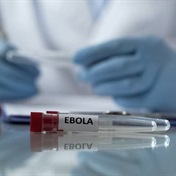
An experimental drug given to two American patients with Ebola is made from tobacco leaves and is hard to produce on a large scale, a leading US doctor said on Tuesday.
Known as ZMapp, the serum consists of three antibodies manufactured in modified tobacco leaves, which take weeks to grow.
It was reportedly rushed to US missionaries Kent Brantly and Nancy Writebol, who were stricken with Ebola while treating patients in Liberia.
Read: How prepared is South Africa for an Ebola outbreak?
Both have shown improvements in their health and are now being treated in isolation at an Atlanta, Georgia hospital.
"We cannot say right now that this drug is particularly promising," said Anthony Fauci, director of the National Institute for Allergy and Infectious Diseases.
"The animal data are very good and the use of it in the two patients is suggestive that it may have a favorable effect, but since there are only two patients I think you have to be careful about making any definitive decision," he told AFP.
No known cure
There is no drug or vaccine on the market against Ebola virus, which causes fever, vomiting, diarrhea, muscle aches and sometimes organ failure and hemorrhaging.
The ongoing outbreak in West Africa is the largest in history, having killed 887 of the more than 1,600 infected.
As for ZMapp, which was first identified as a drug candidate in January, there have been no safety tests yet in humans.
Read: Reaction to Ebola outbreak on Social Media
"As such, very little of the drug is currently available," the company said in a statement, adding that is working to scale up production as soon as possible.
ZMapp is a project of Mapp Biopharmaceutical, Inc. and LeafBio in San Diego, California, Defyrus Inc. in Toronto, Canada, the US government and the Public Health Agency of Canada.
Fauci said that the process of scaling up production will take time.
"It is going to take several months to get even a modest amount," he said.
"So yes, we do want to do clinical trials but the limiting factor is the number of treatment courses that are available."
Africans should get same chance
Noting that American aid workers who contracted the disease in Liberia were given an unapproved medicine before being evacuated back to the United States, the specialists – including Peter Piot, who co-discovered Ebola in 1976 – said Africans affected by the same outbreak should get the same chance.
Piot, David Heymann and Jeremy Farrar, all influential infectious disease professors and respectively directors of the London School of Hygiene and Tropical Medicine, the Chatham House Centre on Global Health Security, and the Wellcome Trust, said there were several antiviral drugs, monoclonal antibodies and vaccines under study for possible use against Ebola.
"African governments should be allowed to make informed decisions about whether or not to use these products – for example to protect and treat healthcare workers who run especially high risks of infection," they wrote in a joint statement.
Read: No licensed drug or vaccines for Ebola – yet
The World Health Organization (WHO), "the only body with the necessary international authority" to allow such experimental treatments, "must take on this greater leadership role", they said.
"These dire circumstances call for a more robust international response," they added.
A spokesman for the Geneva-based WHO told Reuters the United Nations health agency "would not recommend any drug that has not gone through the normal process of licensing and clinical trials".
Treating patients with experimental drugs that have not been tested in humans to determine safety and efficacy is highly unusual.
Read more:
WHO chief says Ebola can be stopped
Pressure on to develop treatment for Ebola
Deadly Ebola virus spreading in West Africa
Image: Scientist working at the laboratory from Shutterstock




 Publications
Publications
 Partners
Partners











